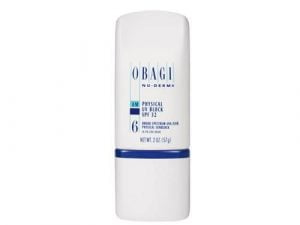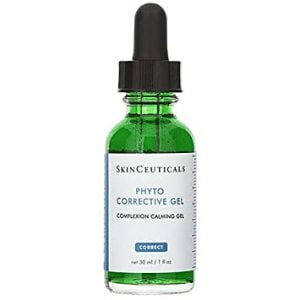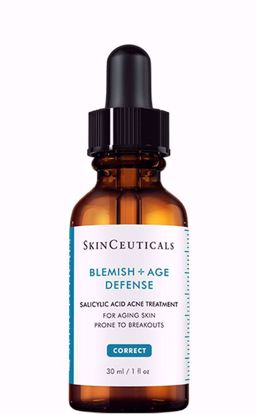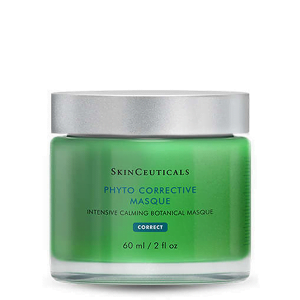How To Make My Skin Less Red

Introduction
Flushed cheeks are endearing when you’re young but having a red face in adulthood can leave you feeling self-conscious and lacking confidence. If this is you, then you’re not alone. Flushed skin is an extremely common skin complaint, and the good news is that there is a plethora of treatments out there to help reduce it!
There are a number of reasons why your skin may be red and inflamed and it can be overwhelming trying to figure out which applies to you. That’s why we have put together this article characterising the main causes of facial redness, the triggers, and products you can use to help reduce redness. Read on to find out!
Atopic Eczema
Eczema is one of the most common causes for redness in the skin and in light of eczema awareness month, it’s going to be the first condition we’ll delve into. Eczema is a name for a group of skin conditions that causes dry, irritated skin because of an impaired skin barrier. Atopic eczema is a type of eczema where there is a sensitivity to allergens and the immune system overreacts to an allergic reaction – other atopic conditions include hay fever and asthma. Atopic eczema is more common in children with around 1 in 5 children being affected but can also develop for the first time in adulthood.
Atopic eczema triggers
Atopic eczema can be triggered by your environment or your genetic make-up. Environmental factors include soaps, detergents, other chemicals, exposure to allergens, bacterial/viral infections, heat, dust, clothing, and stress. Whereas hereditary factors include compromised skin barriers and increased inflammatory or allergic reaction from a compromised immune response.
How to combat atopic eczema
Doctors will usually prescribe a topical cream or oral antibiotic medicines for the most severe eczema cases but there are changes you can make to your skincare routine to reduce your chances of a flare up. We recommend a skin care routine that aims to replenish the moisture in your skin while avoiding inflammatory ingredients.
- Moisturisers: Studies show that skin barrier defects are a common initial step in the development of atopic eczema. Keeping your skin moisturised helps your outer skin layer perform as a better barrier to the environment preventing an eczema outbreak.
- Inflammatory ingredients: products with fragrances, alcohol, sulphates, and preservatives are what you should avoid if you suffer with atopic eczema. Such products can irritate the skin worsening your symptoms.
Contact Dermatitis
Contact dermatitis is a type of eczema that is caused by the skin encountering an irritant or allergen. Like atopic eczema, symptoms include dry and itchy skin that can become red in lighter skin tones or dark brown, purple, or grey in darker skin tones. Although contact dermatitis and atopic eczema are similar in many ways, a contact dermatitis flare up will clear if the allergen or irritant is identified and avoided.
Contact dermatitis triggers
Contact dermatitis is most commonly caused by irritants and allergens such as soaps, detergents, solvents, fragrances, and jewellery. Symptoms can be made worse by heat, cold, friction and dry air.
How to combat Contact dermatitis
Ideally, figuring out what the allergen or irritant that causes your contact dermatitis is the best way to ease your symptoms. However, adopting a skincare routine with products for sensitive skin will help to reduce redness and irritation.
- Gentle cleansers are great for sensitive skin and help to remove dead skin while keeping your skin barrier healthy and intact.
- Anti-inflammatory masks not only help to soothe inflamed skin but also help to replenish moisture into dry skin.
Rosacea
Rosacea is a common skin condition which is characterised by persistent redness on the cheeks, forehead, chin, and nose. It’s caused by dilated blood vessels, small bumps and acne-like spots causing a burning or itching sensation. Rosacea is most common among women between the ages of 40-60 but also occurs in men and younger populations.
Rosacea triggers
Common triggers for rosacea include spicy foods, hot weather, alcohol, aerobic exercise, stress, sun exposure.
How to combat Rosacea
Unfortunately, there is no cure for rosacea but using certain products can help calm the skin. Rosacea is linked to increased activity of the sebaceous (oil-producing) glands so products that aim to reduce sebum production, repair the skin barrier, and reduce inflammation are perfect for those who suffer with rosacea.
- Gentle cleansers remove excess sebum while preventing skin irritation.
- Physical sunscreens protect your skin from harmful UV rays and works better than chemical sunscreens for skin that is prone to inflammation.
- Use facial serums to help soothe irritation and reduce redness.
-

Obagi Physical UV Block SPF32
£65.00 This product is available to purchase post consultation. Take your skin type quiz to start your consultation.
Reordering?
Contact us to connect with an expert and reorder your products.
(View Product Details)START CONSULTATION -

Skinceuticals PhytoCorrective Serum
£56.00 Read more -

ZO Skin Health Gentle Cleanser
This product is available to purchase post consultation. Take your skin type quiz to start your consultation.
Reordering?
Contact us to connect with an expert and reorder your products.
(View Product Details)START CONSULTATION
Over Exfoliation
Exfoliating is a great way to get rid of dead skin cells that might clog your pores, causing acne and an uneven skin tone. However, exfoliating too much or too rigorously can have the opposite effect leaving your skin red and inflamed.
Signs you’re over exfoliating
- Redness and inflammation
- Irritation, burning, or peeling
- New sensitivity to products in your skincare routine
- Increased acne
How to combat over exfoliation
Ditch the fad harsh skin scrubs for more gentle options such as gels with hydrocortisone. Hydrocortisone relieves skin irritation and reduces redness and inflammation so it’s perfect for over exfoliated skin. Once the skin has healed, try exfoliating with a chemical exfoliator with BHA (salicylic acid) as it works as an anti-inflammatory to reduce redness.
Sun exposure
Excessive exposure to the suns UV rays can leave your skin sunburnt. Whether it’s cloudy or sunny it’s always good to protect your skin with sunscreen to avoid UV ray damage and skin irritation. Sunburn symptoms include redness, sensitivity to temperature, tenderness, peeling, and blistering. Those with darker skin tones are generally less susceptible to sunburn however they are not totally free of the effects and still benefit from daily sunscreen use.
How to combat redness from sunburns
Sunburns eventually go away on their own usually taking no more than a week to completely heal but we would suggest applying and aloe vera gel or moisturiser to help ease the pain and redness. Once the sunburn has subsided, applying an SPF sunscreen everyday will help prevent future sunburns or skin irritation from the sun.
Acne
Acne is a skin condition that presents with tender spots such as whiteheads and oily skin. In more severe cases, spots can be cystic which often results in permanent scarring. Acne spots tend to occur when pores become clogged with sebum, dead skin, or bacteria. The body’s natural reaction to clogged pores is to inflame the area causing the red tender bumps we call acne.
Acne triggers
- Diet: Eating foods high in fat, sugar, and dairy are known to worsen acne symptoms. They stimulate the production of hormones that cause excess sebum to be secreted by your sebaceous (oil-producing) glands.
- Certain medications: Avoid medications that contain corticosteroids, testosterone, or lithium.
- Greasy, oily, or unsanitary substances: dirty pillows, dirty phone screens, greasy or oily moisturisers can clog the pores resulting in increased risk of acne spots.
How to combat acne
- Over the counter products: Benzoyl peroxide and salicylic acid both help to clear the pores of excess oil and debris preventing your pores from becoming clogged and inflamed.
- Prescription products: Retinoids are a prescription product that also help to clear clogged pores. In severe cases, a doctor may prescribe oral antibiotics to help kill acne-causing bacteria on the skins surface.
We suggest using skincare products that aim to control oil and redness by decongesting clogged pores and targeting blemishes.
-

Skinceuticals Blemish + Age Defense
£84.00 Add to cart -

ZO Skin Health Gentle Cleanser
This product is available to purchase post consultation. Take your skin type quiz to start your consultation.
Reordering?
Contact us to connect with an expert and reorder your products.
(View Product Details)START CONSULTATION -

ZO Skin Health Oil Control Pads
This product is available to purchase post consultation. Take your skin type quiz to start your consultation.
Reordering?
Contact us to connect with an expert and reorder your products.
(View Product Details)START CONSULTATION
Final Thoughts
Persistent redness on the skin can be frustrating but if you’re using the right skincare to cater to your needs you can reduce the severity of your symptoms. For most conditions that cause redness you will benefit from using products that reduce inflammation so keep a look out for products that are categorised for sensitive skin types.
Still not sure what’s causing your redness or what skincare to use? When it comes to your skin there’s no one size fits all! Try our 3-minute skin type quiz to connect with our Skinora doctors for a bespoke regime tailored to your unique skincare needs. Cut out the guess work and get started today!
How it works

Take our 3 minute quiz
Start with a skin quiz compiled by our doctors
This assesses many factors to allow us to customise your skincare for a £10 skin analysis fee

Receive your Customised Skin Programme
Our skin experts will determine the best products for YOU according to your profile

Choose your products
Pay only for the products you’d like to keep
Redeem the £10 against anything you purchase

Delivery to Your Door
We will customise your programme each time adjusting to changes in the seasons and lifestyle factors so your skincare is customised for you








 Dr Anna Puri is an Aesthetic doctor and GP with over 14 years experience in both the medical and aesthetic fields. She completed her undergraduate training at the University of St Andrews and University of Manchester. She continues to work both as an Aesthetic doctor at her clinics in Ascot and Kew and as a GP. Dr Anna brings her holistic approach to all aspects of the care she provides with a strong focus on advice and treatment that is specifically tailored to her patients expectations and needs. She has worked with cosmeceutical skin care brands and treated a wide range of skin concerns for over a decade. Dr Anna has a special interest in Antiaging skincare and procedures . Dr Anna's work has been featured in various magazines including Lux and The Aesthetics Journal. You can follow Dr Anna on the SkinoraUK instagram page and Skinora YouTube channel.
Dr Anna Puri is an Aesthetic doctor and GP with over 14 years experience in both the medical and aesthetic fields. She completed her undergraduate training at the University of St Andrews and University of Manchester. She continues to work both as an Aesthetic doctor at her clinics in Ascot and Kew and as a GP. Dr Anna brings her holistic approach to all aspects of the care she provides with a strong focus on advice and treatment that is specifically tailored to her patients expectations and needs. She has worked with cosmeceutical skin care brands and treated a wide range of skin concerns for over a decade. Dr Anna has a special interest in Antiaging skincare and procedures . Dr Anna's work has been featured in various magazines including Lux and The Aesthetics Journal. You can follow Dr Anna on the SkinoraUK instagram page and Skinora YouTube channel.